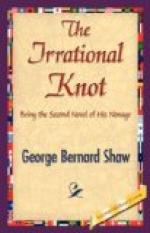“Very wonderful, indeed,” said Douglas, politely, looking askance at him.
“No more wonderful than the flight of a sparrow, I assure you. We shall presently be conveyed to the top of this building by my motor. Here you have a model locomotive, a model steam hammer, and a sewing machine: all of which, as you see, I can set to work. However, this is mere show. You must always bear in mind that the novelty is not in the working of these machines, but the smallness of the cost of working.”
Douglas endured the rest of the exhibition in silence, understanding none of the contrivances until they were explained, and not always understanding them even then. It was disagreeable to be instructed by Conolly—to feel that there were matters of which Conolly knew everything and he nothing. If he could have but shaped a pertinent question or two, enough to prove that he was quite capable of the subject if he chose to turn his attention to it, he could have accepted Conolly’s information on the machinery as indifferently as that of a policeman on the shortest way to some place that it was no part of a gentleman’s routine to frequent. As it was, he took refuge in his habitual reserve, and, lest the exhibition should be prolonged on his account, took care to shew no more interest in it than was barely necessary to satisfy Mr. Lind. At last it was over; and they returned westward together in a hansom.
“He is a Yankee, I suppose,’” said Douglas, as if ingenuity were a low habit that must be tolerated in an American.
“Yes. They are a wonderful people for that sort of thing. Curious turn of mind the mechanical instinct is!”
“It is one with which I have no sympathy. It is generally subject to the delusion that it has a monopoly of utility. Your mechanic hates art; pelts it with lumps of iron; and strives to extinguish it beneath all the hard and ugly facts of existence. On the other hand, your artist instinctively hates machinery. I fear I am an artist.”
“I dont think you are quite right there, Sholto. No. Look at the steam engine, the electric telegraph, the—the other inventions of the century. How could we get on without them?”
“Quite as well as Athens got on without them. Our mechanical contrivances seem to serve us; but they are really mastering us, crowding and crushing the beauty out of our lives, and making commerce the only god.”
“I certainly admit that the coarser forms of Radicalism have made alarming strides under the influence of our modern civilization. But the convenience of steam conveyance is so remarkable that I doubt if we could now dispense with it. Nor, as a consistent Liberal, a moderate Liberal, do I care to advocate any retrogression, even in the direction of ancient Greece.”
Douglas was seized with a certain impatience of Mr. Lind, as of a well-mannered man who had never learned anything, and had forgotten all that he had been taught. He did not attempt to argue, but merely said, coldly: “I can only say that I wish Fate had made me an Athenian instead of an Englishman of the nineteenth century.”




